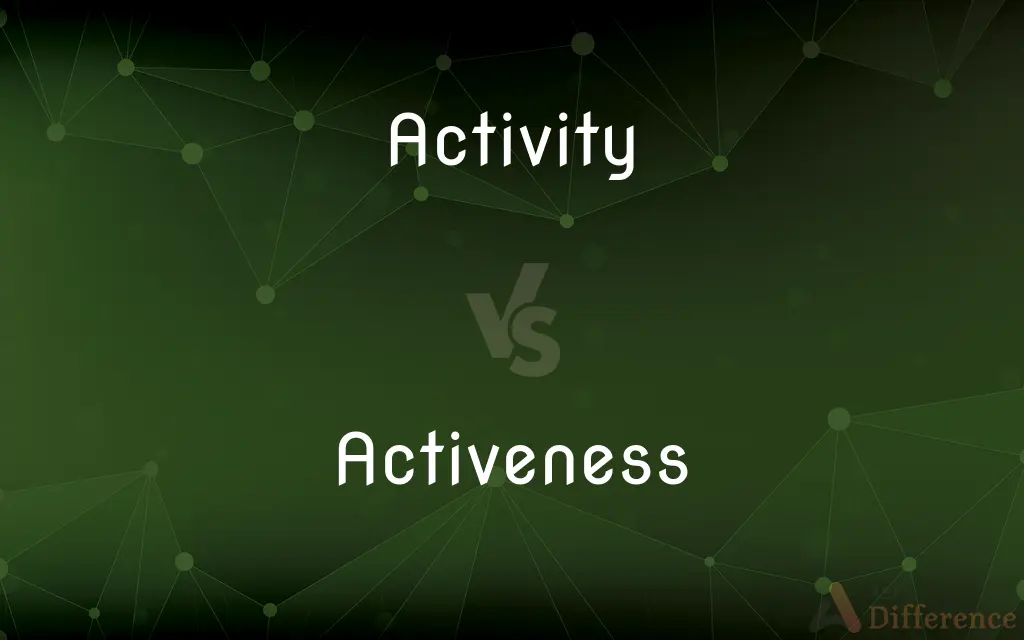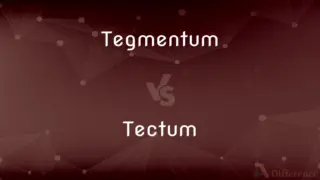Activity vs. Activeness — What's the Difference?
Edited by Tayyaba Rehman — By Maham Liaqat — Updated on April 3, 2024
Activity refers to the state of being active or engaged in actions, while activeness emphasizes the quality or degree of being active, often in specific contexts.

Difference Between Activity and Activeness
Table of Contents
ADVERTISEMENT
Key Differences
Activity encompasses any form of action or engagement, such as physical movement, mental tasks, or social interactions. It is a broad term that can apply to various contexts, from leisure activities to professional tasks. On the other hand, activeness is a characteristic that describes how active someone or something is, focusing more on the level of energy and engagement than on the specific actions being performed.
While activity can refer to both individual and group actions, ranging from exercise to participating in a meeting, activeness is often used to describe the disposition or tendency of a person or entity towards being active. It implies a measure of frequency or intensity in participation or engagement.
Activities are identifiable and can be planned, scheduled, or spontaneous, such as going for a jog, reading a book, or attending a conference. Activeness, whereas, is a quality that might influence the choice or intensity of these activities, highlighting a predisposition towards engaging in them.
The term "activity" is versatile, used to categorize and describe various forms of engagements across different domains, including education, recreation, and business. Activeness, on the other hand, serves more as an attribute or measure of how dynamically individuals or groups engage in those domains.
In discussing a person's daily routine, one might list their activities to include work, exercise, and leisure time. Activeness, however, would describe the vigor and energy with which they pursue these activities, indicating a more qualitative aspect of their engagement.
ADVERTISEMENT
Comparison Chart
Definition
Engagement in actions or tasks.
The quality or degree of being active.
Context
Broad, applies to any action or engagement.
Often refers to the disposition or tendency towards activity.
Usage
Describes specific actions or engagements.
Describes the quality or level of energy and engagement.
Examples
Exercise, reading, attending a meeting.
High activeness in sports, active participation in discussions.
Measurement
Can be quantified by duration or type.
Measured by frequency, intensity, or vigor of participation.
Compare with Definitions
Activity
Engagement in physical or mental tasks.
The conference offered a variety of interactive activities.
Activeness
The quality of being active and energetic.
His activeness in community service sets him apart.
Activity
The level of action or motion in a given area.
The downtown area is known for its high level of activity.
Activeness
The degree of dynamic participation in an event or task.
The activeness of the debate team was commendable.
Activity
The state of being active or operative.
The activity in the stock market today was unprecedented.
Activeness
A disposition towards physical activity.
Her activeness is evident in her daily morning runs.
Activity
A specific pursuit or hobby.
Her favorite activity is painting.
Activeness
A measure of the intensity or energy put into actions.
The activeness of his responses highlighted his enthusiasm.
Activity
Actions performed as part of a process or operation.
Volcanic activity can be a sign of an impending eruption.
Activeness
The propensity to engage in activities.
The new policy aims to increase student activeness in extracurriculars.
Activity
The state of being active.
Activeness
Being in physical motion
Active fish in the aquarium.
Activity
Energetic action or movement; liveliness.
Activeness
Functioning or capable of functioning.
Activity
A specified pursuit in which a person partakes.
Activeness
Marked by energetic activity; busy
Active stock and bond markets.
Spent an active day sightseeing.
Activity
An educational process or procedure intended to stimulate learning through actual experience.
Activeness
Involving or requiring physical exertion and energy
An active workout at the gym.
Activity
The intensity of a radioactive source.
Activeness
Being in a state of action; not quiescent
Active hostilities along the border.
Activity
The ability to take part in a chemical reaction.
Activeness
Erupting or liable to erupt; not dormant
An active volcano.
Activity
A physiological process
Respiratory activity.
Activeness
Marked by or involving direct participation
Took an active interest in politics.
Played an active role on the committee.
Activity
(uncountable) The state or quality of being active; activeness.
Pit row was abuzz with activity.
Activeness
Currently in use or effect
An active membership.
Activity
(countable) Something done as an action or a movement.
The activity for the morning was a walk to the store.
Activeness
Openly acknowledged or expressed
An active dislike of the new neighbors.
Activity
(countable) Something done for pleasure or entertainment, especially one involving movement or an excursion.
An increasing number of sports activities are on offer at the university.
Quilting can be an enjoyable activity.
Activeness
Producing an intended action or effect
Active ingredients.
Activity
The lexical aspect (aktionsart) of verbs or predicates that change over time and have no natural end point.
Activeness
Indicating that the grammatical subject of a verb is performing or causing the action expressed. Used of a verb form or voice.
Activity
(physics) The number of radioactive decays per unit time. Unit for it: becquerel or curie Category:en:Radioactivity
Activeness
Expressing action rather than a state of being. Used of verbs such as run, speak, and move.
Activity
The propery of substances to react with other substances
Activeness
Of or relating to the management of an investment portfolio by continually making investment decisions based on new information as opposed to maintaining a predetermined strategy or reproducing the returns of a market or index.
Activity
The state or quality of being active; nimbleness; agility; vigorous action or operation; energy; active force; as, an increasing variety of human activities.
Activeness
Being a source of electrical energy, as a generator.
Activity
Any specific activity;
They avoided all recreational activity
Activeness
Capable of converting or amplifying voltages or currents, as a diode or transistor.
Activity
The state of being active;
His sphere of activity
He is out of action
Activeness
Being on full military duty and receiving full pay.
Activity
An organic process that takes place in the body;
Respiratory activity
Activeness
The active voice.
Activity
(chemistry) the capacity of a substance to take part in a chemical reaction;
Catalytic activity
Activeness
A construction or form in the active voice.
Activity
A process existing in or produced by nature (rather than by the intent of human beings);
The action of natural forces
Volcanic activity
Activeness
A participating member of an organization
Union actives.
Activity
The trait of being active; moving or acting rapidly and energetically;
The level of activity declines with age
Activeness
The state or quality of being active.
Activeness
The quality of being active; nimbleness; quickness of motion; activity.
Activeness
The state of being active;
His sphere of activity
He is out of action
Activeness
The trait of being active; moving or acting rapidly and energetically;
The level of activity declines with age
Common Curiosities
What is activity?
Activity refers to the state of being active or engaging in actions or tasks.
How do activity and activeness relate to physical exercise?
Physical exercise is a type of activity, while activeness can describe one’s general tendency or energy level in performing exercises.
Is reading a book considered an activity?
Yes, reading a book is considered an activity as it involves mental engagement and action.
Can an object have activeness?
Typically, activeness is attributed to living beings due to its emphasis on energy and tendency, but it can metaphorically apply to objects in describing their operational state.
What role does activeness play in education?
Activeness in educational settings can enhance learning and participation, contributing to better academic outcomes.
How do you measure activeness?
Activeness can be measured by the frequency, intensity, or vigor of participation in activities.
Are all activities indicative of high activeness?
Not necessarily; activities can vary in intensity, and someone can engage in low-intensity activities, which doesn’t always reflect high activeness.
What does activeness mean?
Activeness describes the quality or degree of being active, often emphasizing energy and engagement.
Is activeness the same as enthusiasm?
While closely related, activeness refers more to the level of activity, whereas enthusiasm is about passion and eagerness.
Can technology affect one's activeness?
Yes, technology can influence activeness, both positively by encouraging active engagement and negatively by promoting sedentary behaviors.
Can activeness change over time?
Yes, a person’s activeness can change due to factors like health, interest, and lifestyle.
How does activeness impact health?
High activeness, especially in physical activities, is generally associated with better physical and mental health.
How can a company measure the activeness of its employees?
Companies can measure employee activeness through their participation in work tasks, initiatives, and corporate events.
Does high activeness always lead to productivity?
High activeness often contributes to productivity, but it must be well-directed and balanced to avoid burnout.
Is meditation considered an activity?
Yes, meditation is considered an activity as it involves mental action and focus, despite its stationary nature.
Share Your Discovery

Previous Comparison
Tegmentum vs. Tectum
Next Comparison
Mescaline vs. PeyoteAuthor Spotlight
Written by
Maham LiaqatEdited by
Tayyaba RehmanTayyaba Rehman is a distinguished writer, currently serving as a primary contributor to askdifference.com. As a researcher in semantics and etymology, Tayyaba's passion for the complexity of languages and their distinctions has found a perfect home on the platform. Tayyaba delves into the intricacies of language, distinguishing between commonly confused words and phrases, thereby providing clarity for readers worldwide.
















































